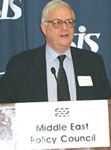 Photo: John Bolton, George W. Bush and Condoleezza Rice
Photo: John Bolton, George W. Bush and Condoleezza Riceduring a United Nations (UN) Security Council meeting
September, 2005 in New York City
Declan Ganley's Libertas helped US neo con and intelligence interests by launching a hugely funded anti Lisbon campaign in Ireland. Ganley also aided his US Defense Dept. paymasters by fronting the campaign. His Rivada Pacific is a major US military communications contractor see over 40 contracts awarded to Ganley's firm here
In the days before the Lisbon Treaty referendum was held in Ireland in June 2008, John Bolton, a former US ambassador to the UN who served under Ronald Reagan and George Bush senior, visited Dublin and said the new Treaty could hurt the military alliance between Europe and the US.
Ganley's business partner Don Di Marino had direct connections with neo con John Bolton as they both served under Ronald Reagan. Don De Marino has been Declan Ganley's business partner in various ventures since the 1990 including Ganley's current firm Rivada, a US defence contracting out fit that uses laws designed to help Native American corporations get competition free contracts from the federal government. The disgraced Ted Stephens , Republican senator from Alaska was instrumental in this and also recieved campaign contribution's from Ganley's wife Delia.
Bolton arrived in Ireland just before the vote in June at a time when the Yes side was showing a slight lead in the polls. He warned that the treaty was " a huge mistake" that would "undercut Nato"
see the Telegraph article of 09 Jun 2008 on Bolton's interference in Irish and European internal politics here
On 18 June following Irish voters rejecting the Lisbon Treaty The Guardian's Ilana Bet-El
asked
"Why did the famous neo con and former UN ambassador take sides in Ireland's referendum?" see here
Bolton was speaking only days before Ireland held a referendum on the EU Treaty, the only member country to do so, when the latest polls showed the Yes campaign slightly ahead. Bolton has previously warned the deal threatens Britain's special relationship with the United States argued that if the EU has its own military capability, people will think Nato is redundant and Europe "can take care of their own defence"
An article from Jane's Intelligence Digest - January 18, 2008 explained that the USA intelligence community were worried about the effect that the Lisbon ratification would have. They feared it would stop US intelligence and security officials being able to circumvent EU institutions by dealing with individual countries directly.
This adds some weight to the suspicions and claims that Declan Ganley's Libertas campaign was in fact a spoiler operation which was orchestrated by US neo cons. The financing of Libertas's campaign is still a mystery and is currently being investigated by Ireland's Standards in Public Office Commission an independent body established in December 2001 by the Standards in Public Office Act 2001. Sipo has six members and is chaired by a former Judge of the High Court. It has supervisory roles under three separate pieces of legislation. Its functions include supervising the disclosure of interests and compliance with tax clearance requirements, the disclosure of donations and election expenditure and the expenditure of state funding received by political parties.
Their report on Libertas is awaited with great interest. Read Jane's report below:
Jane's Intelligence Digest - January 18, 2008
New EU treaty worries US intel services
As EU governments focus on securing ratification of the proposed Lisbon Reform Treaty in 2008, United States policymakers are concerned its provisions could present serious challenges to transatlantic intelligence and homeland security co-operation.
The main US reservation is that by transferring additional law and justice functions from the individual EU member states to EU institutions, the treaty could disrupt existing bilateral relations between US and EU governments without establishing anything better.
Washington still prefers bilateral co-operation
Since the September 2001 terrorist attacks on the US, its intelligence and homeland security officials have prioritised the strengthening of collaboration with European governments against the mutual threat of Islamist-inspired terrorism. Despite periodic expressions of discontent, which naturally attracted the most media attention, US intelligence community officials, US law enforcement agencies and the Department of Homeland Security routinely praise their European counterparts for using various bilateral mechanisms to pursue joint initiatives encompassing non-proliferation, immigration and other counter-terrorism-related issues.
In contrast, Washington-based policy makers routinely criticise EU-wide bodies for proving at best ineffectual, and at worst downright disruptive, in their efforts in the global war on terrorism. Common criticisms include an inability to determine an appropriate point of contact for US officials in Brussels, a perception that many Europeans are misguidedly seeking a negotiated solution to the war on terrorism, and excessive preoccupation on the part of EU lawmakers with protecting the privacy of EU nationals suspected of engaging in terrorist-related activities.
Treaty worries
US intelligence and security officials have been able to circumvent EU institutions in many cases so far by relying extensively on formal and informal arrangements with the individual member governments. In addition, Washington has felt confident that its European allies would use their powers to veto unwelcome EU-wide proposals in areas related to security and defence. If adopted, the Lisbon treaty could threaten many of these arrangements. Most notably, the treaty would expand the range of policy issues that can be decided by qualified majority voting, reducing a single country's ability to exercise a national veto. Some of the new justice and home affairs issues no longer requiring unanimity - migration, criminal justice, and judicial and police co-operation - concern topics of great significance for homeland security and counter-terrorism. US officials fear that a majority of EU members will agree on policies that could make it harder for US and EU governments to freeze the assets of suspected terrorists, deny asylum to feared extremists, or store and share data about EU nationals who US intelligence believes may be engaged in threatening activities.
The treaty's expanded authorisation of 'opt-outs' and 'opt-ins' also generates unease among US homeland security managers. The opt-outs could enable certain EU members to exempt themselves from agreements negotiated between Brussels and Washington. The opt-ins would permit select EU governments to pursue 'enhanced co-operation' in other areas - such as developing EU-based defence capacities that the US would prefer to see assigned to NATO, where Washington exercises predominant influence. According to the current version of the treaty, the UK, Denmark and Ireland have the right to opt out of EU policies regarding justice and home affairs, but cannot prevent other member countries from moving ahead in these areas without them.
Members of the US intelligence community have also warned that the proposed Lisbon treaty could reduce the exchange of sensitive information between Washington and EU members. If the treaty is ratified, US officials would increasingly worry that individual EU governments would find it harder to keep any classified intelligence provided by Washington away from EU-wide institutions, and therefore all other EU member governments. Such widespread sharing would increase risks that hostile governments, terrorist operatives, or the media would learn sensitive US sources and methods.
US homeland security managers are also disturbed by the provisions of the Lisbon treaty that would remove many restrictions limiting the jurisdiction of the European Court of Justice to rule on members' asylum, visa and immigration policies.
Members of President George W Bush's administration still complain about how the court struck down a deal they reached with the European Commission in 2004 to obtain the names of airline passengers traveling to the US. Despite the US' insistence that they needed to cross-check the names and addresses of people seeking to enter the US against its watch lists of suspected terrorists before the visitors actually reached US shores, the European Court, supported by many members of the European Parliament, ruled that such sharing would have violated EU privacy laws.
(c) 2008 Jane's Information Group
Jane's Intelligence Digest - January 18, 2008 - reference
Short version available on Janes's website here
See also see Village Voice Morning Report 3/8/05The Neocons' Wet Dream: John Bolton






John Bolton made his comments advising the Irish electorate to Vote No in the Lisbon Referendum at a speech in University College Dublin.
ReplyDeleteBizarrely the speech got only wire service coverage and was only picked up in the Irish Times and, even there, it was missed by Irish Opinion writers.
The UK Guardian picked up on it but after the referendum.
On the day of the vote I posted a reference to the the article on the website, Politics.ie (the largest political website albeit run by Libertas lackey David Cochrane and covertly used to promote a Libertas agenda).
My posting was met by a chorus of disbelief. One poster said if it was true it would change his vote from no to yes.
I then posted the article itself. And then I discovered the above information about Cochrane. Information that would lead one to sing off permanently.
The posting with the article lasted some 60 seconds before it was edited - all the 'Vote No because a No vote would damage Nato' quotes were removed.
Despite the fact that other articles are quoted in full, Bolton quotes,Cochrane would have us believe, were removed for "copywright reasons".
I continued, however, to probe Declan Ganley's lack of accountability and transparency and highlighted references to the book by respected journalist T Chrsitan Miller "Blood Money. Wasted Billions, Lost Lives And Corporate Greeed in Iraq".Miller accuses Ganley through his pursuit of a quick buck of contributing to the deaths of countless Iraqi policemen and US soldiers.
In the spirit of transparent debate, I was then banned from this Libertas front site and only got back in when Phoenix magazine wrote about the event.
Further probing of the murku affairs and biographical inconsistencies of Declan Ganley then led to a lifelong ban.